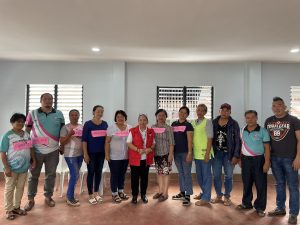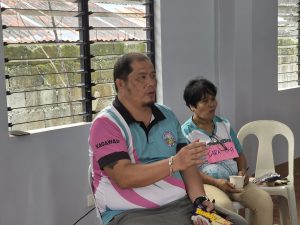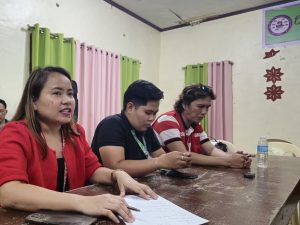
In a bid to evaluate the effectiveness of employed capacity-building and learning development activities vis-à-vis program completion, the Kapit-Bisig Laban sa Kahirapan – Comprehensive and Integrated Delivery of Social Services (KALAHI-CIDSS) Regional Program Management Office (RPMO) of the Department of Social Welfare and Development (DSWD) Field Office Caraga recently conducted its pilot Focus Group Discussions (FGD) with community volunteers, the Municipal Coordinating Team (MCT), and the Area Coordinating Team (ACT) in Sibagat, Agusan del Sur.
With the program’s pivotal principle, “community-driven development,” the activity commenced with a discussion involving dedicated Community Volunteers (CVs) from Brgy. Afga, some of whom have been engaged with KALAHI-CIDSS for more than two years.
In her opening remarks, Ms. Ester Villamor, the KALAHI-CIDSS Deputy Regional Program Manager, formally thanked the participants for their time and effort in partaking in this important assessment.
During the first session, Hon. Virgido Galo Jr., a community volunteer who also serves as an elected Kagawad of Brgy. Afga, reflected on his two-year journey with the program. “Akoang nabati kay excitement ug kabalaka. Kabalaka kay basin di nako magampanan ang akoang pagka-volunteer, labi na kay [naapil ko] sa BDC-TWG. Wala ko’y kahibalo about sa construction, sa mga pamaagi, sa pag-manage sa mga tao, ug pagdumala sa komunidad (I had mixed emotions of excitement and worry. I was worried whether or not I would be able to function as an effective volunteer, especially that I was chosen to be part of the BDC-TWG and I did not have any experience with construction projects, even in managing and handling people), ” Galo shared. However, he expressed that his experiences as part of BDC-TWG and upskill sessions he received as a volunteer allowed him to develop the prowess needed to be an effective barangay official.
Ms. Jaima Lagnas also shared her initial concerns about her role as member of the Monitoring and Inspection Team (MIT). “Nabalaka ko kay unsa ra gud ko, elementary graduate ra ko. Nakita nako na ing-ana diay ang mga kinahanglan na buluhaton, nagpadayon ko sa training, didto nadungagan akoang kahibalo. [Nakasayod ko] unsa’y mga buluhaton isip MIT, mao’y magcheck-up sa materyales na i-deliver sa barangay (I was worried because I was only able to complete my elementary education. I realized the importance of our tasks and continued with the training, which enhanced my knowledge. I learned what needed to be done as part of MIT, such as checking materials delivered to the barangay),” Lagnas said. She also expressed her apprehensions due to her husband’s doubts about her capabilities, given her lack of formal education. “Nagpadayon gihapon ko ug apil sa mga seminar ug trainings kay arun didto nako mahibaw-an ug unsa akoang mabuhat arun makatabang ko sa katawhan nga wala man koy kwarta na mahatag, ako ra gyu’ng gugma ug paghatag sa akoang oras kay kabahin ko sa subproject na ihatag sa amoang barangay (I pursued participating in seminars and trainings because that is where I can find out what I can do so that I can help my community. I do not have any money to give, only my love and time in being part of the sub-project development for our barangay),” she added.

During the second FGD session intended for the MCT, Mr. Niel Dan Valdez, who has served as a Municipal Community Empowerment Facilitator for 18 months, shared that he not only learned how to engage with the communities but also developed his interpersonal and communication skills. “Na-empower pd ko while nag-empower sa communities, (I was empowered while empowering the communities),” Valdez exclaimed.
Ms. Edna G. Perang, the Sibagat Municipal Planning Development Coordinator, who has been leading their locality’s engagement with KALAHI-CIDSS since 2012 as the Municipal Area Coordinator, proudly shared that apart from putting resources to augment the Community Empowerment Activity Cycle (CEAC) activities, the LGU had replicated the training programs unfurled by KALAHI-CIDSS, specifically those concerning the Enhanced Barangay Development Plan (EBDP). She recounted that this was originally conducted by KALAHI-CIDSS for seven barangays, out of twenty-four, under the program’s scope. “After the operation, kadto gyud gi-follow namo na module. And then, [mao] ang gihimo namo karun kay we are also in the process of assisting the formulation of BDPs sa tanan other barangays (After the operation, that was exactly the module we followed. And then, [this is] what we are doing now because we are also in the process of assisting the formulation of BDPs in all other barangays),” Perang explained. She emphasized that in light of the LGU’s commitment to adopting this as a best practice, they utilized the program’s tools to incorporate the EBDP training into the remaining uncovered seventeen barangays. Just last semester, her office successfully covered nine of these seventeen barangays.
The last session of the pilot FGD was conducted with the program’s very own ACT. Ms. Arcelie A. Faustor, the Area Coordinator of Sibagat who has been employed under KALAHI-CIDSS for nine years, shared that she has participated in over 16 training sessions throughout her tenure. She highlighted the “Refresher Course on RA9184” and “A Reinforcement Course on KALAHI-CIDSS Grievance Redress System” as the most recent and impactful trainings she attended.
When queried how those trainings apply to her daily life and delivery of service as an Area Coordinator, Faustor quipped, “Overall, these training sessions had been very impactful gyud sa akoa as a person and as a facilitator. Kay somehow they equipped me practical skills and knowledge gyud na ma-implement nako [ang program] ug ma-manage nako effectively ang team, akoang kaugalingon, ug as a facilitator [sa community] (Overall, these training sessions had been very impactful to me as a person and as a facilitator. Because somehow they equipped me with practical skills and knowledge that I can actually implement [the program] and effectively manage the team, myself, and as a facilitator [in the community]),” she shared. She further elaborated on how these trainings have enabled her to empower communities to complete sub-projects that directly address their needs.
These FGDs aims to gauge the impact of capacity-building and learning development activities provided by KALAHI-CIDSS, equipping the community with tools to drive their own development. Participants shared stories of personal feats and challenges, offering invaluable feedback for future initiatives. Those from Mr. Galo, Ms. Lagnas, Mr. Valdez, Ms. Perang, and Ms. Faustor are just a few examples of the many successes that the program has achieved. Over its more than 21 years of implementation, KALAHI-CIDSS has truly exemplified the power of collective effort. By capacitating communities, the program has demonstrated that they can initiate and sustain transformative change for themselves.


